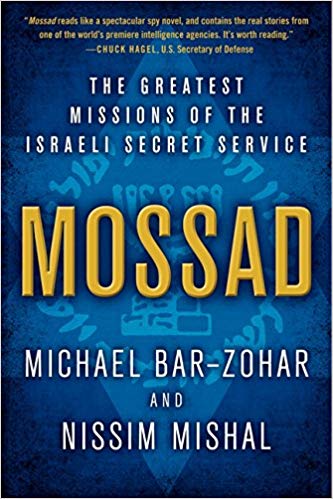Mossad Audiobook by Michael Bar-Zohar

text
At once of so much tension and also conflict between East – over Gaza, Iran’s nuclear program, the UN status of Palestine as well as the fate of Yasser Arafat – this research of Mossad, Israel’s foreign knowledge agency, is released at an especially prompt moment.
As a slim spy story or experience publication, it works well. Mossad Audiobook by Michael Bar-Zohar Online. The authors compose with vigor and speed, and engagingly sprinkle their message with creative discussion, vibrant personality summaries and also unique setups.
Get loan off this publication online at the Independent Bookshop
The majority of their stories know ones – such as the kidnapping of Holocaust organiser Adolf Eichmann in Argentina and also the undercover work of master-spy Elie Cohen – yet they include more recent episodes, such as Israel’s battle of the Syrian atomic power plant and the assassinations of Iranian nuclear researchers. Neither do the authors shy from mentioning a few of Mossad’s many failures, such as the bungled effort to execute the Hamas leader Khaled Mash’ al in Amman.
It is a shame that several of the extra acquainted stories have actually not been changed with even more relevant ones. In the 1970s, for example, Mossad worked very closely with the Shah’s Iran, helping train its security forces. After the Islamic Transformation, Israel privately colluded with the ayatollahs, equipping a “terrorist” routine that paid, and still pays, lip service to the destruction of the Jewish state. Even the Irangate rumor of the 1980s – to which Mossad was essential – gets only a quick mention.
However the actual problem with this publication exists somewhere else. It has been stated that Mossad is “good on terrorism yet bad on politics”, and it is this broader perspective that is so sorely missing. The lack of political context is blazing. Really little is stated concerning the development of the Jewish state in 1948, or regarding the far-ranging geopolitical result of the Six Day Battle in 1967. Without this context, the viewers is left presuming regarding who “the Palestinians” are. Of these people, their story and also struggle, we find out nothing except that numerous appear to be “terrorists”.
It would likewise have been interesting to have discovered something of Mossad’s early assessments of the aftermath of the 1967 war (sharp observers like the political leader Zalman Aran cautioned that the procurement of large brand-new areas would “choke” Israel) in addition to of the Arab Springtime. Similarly, the writers ignore the wider image into which Mossad’s tasks fit. For example, the viewed benefits of an assassination operation have to be evaluated against the political price. In each instance, the writers could have asked if such costs deserved paying and left the reader to determine.
At what point, for instance, do such procedures placed Israel in danger of becoming a “terrorist state”? The current strike on Gaza prompted the Turkish head of state to charge Israel with blatant “terrorism”, and also the writers minimize the damage Mossad operations have actually often done to Israel’s connections with its closest allies. In the days of the British Mandate over Palestine, such a ruthless method likewise tarnished the Jewish reason: Winston Churchill explained one assassination by militia as “banditry deserving of the Nazi Germans”.
Such procedures are also suitable to prompt revenge, creating the vicious circle of tit-for-tat reprisals right into which the Middle East has long descended, as Israel’s recent murder of Hamas commander Ahmed al-Jabari in Gaza illustrated. But just seldom do the writers show just how easily this occurs.
These are hefty prices to spend for operations that have actually not constantly proffered incentives. Mossad Audio Book Free. So Mossad’s assassination of the PLO leader Abu Jihad in 1988 was strongly criticised in Israel, where some concerned him as a conciliatory figure. “We are looking for Palestinians to talk with us,” bemoaned Ezer Wiezman, “and also liquidating people will not progress the tranquility process.”
The writers are additionally oddly callous the larger measurements surrounding Mossad’s activities. They estimate the old adage that “if someone concerns eliminate you – rise and also eliminate him initially”. But the threats of a “preventive war”, in which blood is shed before it is absolutely necessary, were apparent long prior to the 2003 Iraq invasion. As an example, Operation Damocles, the murder of German researchers in the very early 1960s, was unneeded: the researchers were years, possibly years, from building effective Egyptian projectiles. And also when they explain murders in Gaza in the 1970s that were “contrary to autonomous behavior”, the image of criminal Mossad physical violence, supposedly to reduce “horror”, is a cooling one.